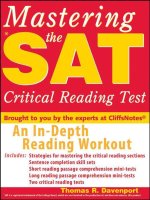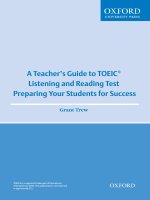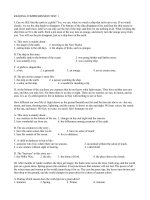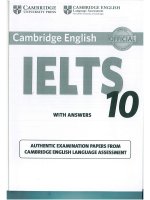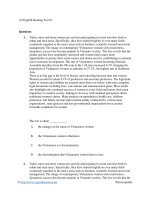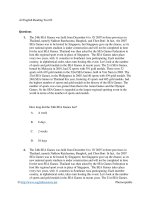B2 Entry Reading Test (2)
Bạn đang xem bản rút gọn của tài liệu. Xem và tải ngay bản đầy đủ của tài liệu tại đây (58.72 KB, 5 trang )
B2 ENTRY READING TEST
Time allowance: 40 minutes
Read the passages and circle the correct answer
PASSAGE 1- Questions 1-5
New TV Star
Caroline Benson talks about her first TV role 'I never expected to spend some of my first
year at university filming The Finnegans. I'd only ever acted at school, but I'd loved the book
since I was eleven. My grandmother used to say I was just like Polly Finnegan and I always
imagined myself playing her.
I'd taken a year off to go travelling before university. While I was in Chile, my mother emailed
me to say there were plans to turn the book into a TV drama. I knew I had to go for the part. She
was surprised at first, but sent my photograph to the director and persuaded him to meet me. I
flew back and got the part.
The outdoor filming started a week into term, so I got permission from the university to be
away for three weeks. Once I was back at university, I got up at 6.00 am to write the essays I'd
missed. I didn't tell my university friends, but they found out and thought it was great.
It was an amazing experience — I'm so lucky. After university, I definitely want to make
acting my career. I'm not from an acting family, though my grandfather was an opera singer. I've
tried for other TV parts but haven't received any offers yet.
I don't know how I managed it all, because I had a full social life too. When filming finished, I
hardly knew what to do. I've since appeared in two college plays. Unfortunately, I haven't been
home much and now my first year at university is over, I'm off to Greece for the summer with
friends.'
1. In this text, Caroline Benson is _____.
A. advising students to finish studying before taking up acting.
B. describing how pleased she was about this opportunity to act.
C. warning other young people that acting is a difficult career.
D. explaining why she has always wanted to be an actor.
2. Why did Caroline decide to try for a part in The Finnegans?
A She thought the book would make a great TV drama.
B. She agreed with her grandmother that she should apply.
C. She felt she was perfect for the part of Polly.
D. She was anxious about starting university.
3. What does Caroline say about her mother?
A. She encouraged Caroline to keep travelling.
B. She felt Caroline would be a good actor.
C. She was sorry she had emailed Caroline.
D. She helped Caroline to get the part.
4. How did Caroline manage to find time to do the filming?
A. She missed lectures and hoped nobody would notice.
B. She delayed going to university until filming was over.
C. She took time off and did her college work later.
D. She asked her friends to help with her essays.
1
5. Which of the following would Caroline write to a penfriend?
A. I'm going to continue with my studies, but hope to have the opportunity to do another TV
programme soon.
B. Now I've finished both the filming and my first year at university, I plan to spend more time
with my family.
C. I enjoyed filming the TV drama but I've missed having a social life — I don't know what to
do at weekends.
D. Acting is more difficult than I'd expected, but I've learned a lot from other members of my
family who work in the business.
PASSAGE 2- Questions 6-15
It’s often said that we learn things at the wrong time. University students frequently do the
minimum of work because they’re crazy about a good social life instead. Children often scream
before their piano practice because it’s so boring. They have to be given gold stars and medals
to be persuaded to swim, or have to be bribed to take exams. But the story is different when
you’re older.
Over the years, I’ve done my share of adult learning. At 30, I went to a college and did
courses in History and English. It was an amazing experience. For starters, I was paying, so
there was no reason to be late – I was the one frowning and drumming my fingers if the tutor
was late, not the other way round. Indeed, if I could persuade him to linger for an extra five
minutes, it was a bonus, not a nuisance. I wasn’t frightened to ask questions, and homework
was a pleasure not a pain. When I passed an exam, I had passed it for me alone, not for my
parents or my teacher. The satisfaction I got was entirely personal.
Some people fear going back to school because they worry that their brains have got rusty.
But the joy is that, although some parts have rusted up, your brain has learnt all kinds of other
things since you were young. It has learnt to think independently and flexibly and is much better
at relating one thing to another. What you lose in the rust department, you gain in the maturity
department. In some ways, age is a positive plus. For instance, when you’re older, you get less
frustrated.
Experience has told you that, if you’re calm and simply do something carefully again and
again, eventually you’ll get the hang of it. The confidence you have in other areas – from being
able to drive a car, perhaps – means that if you can’t, say, build a chair instantly, you don’t, like
a child, want to destroy your first pathetic attempts. Maturity tells you that you will, with
application, eventually get there.
I hated piano lessons at school, but I was good at music. And coming back to it, with a
teacher who could explain why certain exercises were useful and with musical concepts that, at
the age of ten, I could never grasp, was magical. Initially, I did feel a bit strange, thumping out a
piece that I’d played for my school exams, with just as little comprehension of what the
composer intended as I’d had all those years before. But soon, complex emotions that I never
knew poured out from my fingers, and suddenly I could understand why practice makes perfect.
6. It is implied in paragraph 1 that ______.
A. young learners are usually lazy in their class
B. parents should encourage young learners to study more
C. teachers should give young learners less homework
D. young learners often lack a good motivation for learning
2
7. The writer’s main point in paragraph 2 is to show that as people grow up, ______.
A. they cannot learn as well as younger learners
B. they have a more positive attitude towards learning
C. they get more impatient with their teachers
D. they tend to learn less as they are discouraged
8. The phrase “For starters” in paragraph 2 could best be replaced by “______”.
A. At the starting point
B. First and foremost
C. At the beginning
D. For beginners
9. While doing some adult learning courses at a college, the writer was surprised ______.
A. to have more time to learn
B. to feel learning more enjoyable
C. to be able to learn more quickly
D. to get on better with the tutor
10. In paragraph 3, the word “rusty” means ______.
A. not as good as it used to be through lack of practice
B. impatient because of having nothing to do
C. staying alive and becoming more active
D. covered with rust and not as good as it used to be
11. The phrase “get there” in paragraph 4 is closest in meaning to “______”.
A. arrive at an intended place with difficulty
B. receive a school or college degree
C. achieve your aim with hard work
D. have the things you have long desired
12. All of the following are true about adult learning EXCEPT ______.
A. experience in doing other things can help one’s learning
B. young people usually feel less patient than adults
C. adult learners have fewer advantages than young learners
D. adults think more independently and flexibly than young people
13. It can be inferred from paragraph 4 that maturity is a positive plus in the learning process
because adult learners ______.
A. are able to organize themselves better than younger learners
B. are less worried about learning than younger learners
C. pay more attention to detail than younger learners
D. have become more patient than younger learners
14. It is implied in the last paragraph that when you learn later in life, you ______.
A. are not able to concentrate as well as when you were younger
B. should expect to take longer to learn than when you were younger
C. find that you can recall a lot of things you learnt when younger
D. can sometimes understand more than when you were younger
15. What is the writer’s main purpose in the passage?
A. To describe adult learning methods
B. To encourage adult learning
C. To show how fast adult learning is
D. To explain reasons for learning
3
PASSAGE 3- Questions 16-25
Television has transformed politics in the United States by changing the way in which
information is disseminated, by altering political campaigns, and by changing citizen's patterns
of response to politics. By giving citizens independent access to the candidates, television
diminished the role of the political party in the selection of the major party candidates. By
centering politics on the person of the candidate, television accelerated the citizen's focus on
character rather than issues.
Television has altered the forms of political communication as well. The messages on
which most of us rely are briefer than they once were. The stump speech, a political speech
given by traveling politicians and lasting 3/2 to 2 hours, which characterized nineteenth-century
political discourse, has given way to the 30-second advertisement and the 10 second "sound
bite" in broadcast news. Increasingly the audience for speeches is not that standing in front of
the politician but rather the viewing audience who will hear and see a snippet of the speech on
the news.
In these abbreviated forms, much of what constituted the traditional political discourse of
earlier ages has been lost. In 15 or 30 seconds, a speaker cannot establish the historical
context that shaped the issue in question, cannot detail the probable causes of the problem, and
cannot examine alternative proposals to argue that one is preferable to others. In snippets,
politicians assert but do not argue.
Because television is an intimate medium, speaking through it require a changed political
style that was more conversational, personal, and visual than that of the old style stump speech.
Reliance on television means that increasingly our political world contains memorable pictures
rather than memorable words. Schools teach us to analyze words and print. However, in a word
in which politics is increasingly visual, informed citizenship requires a new set of skills.
Recognizing the power of television's pictures, politicians craft televisual, staged events,
called pseudo-event, designed to attract media coverage. Much of the political activity we see
on television news has been crafted by politicians, their speechwriters, and their public relations
advisers for televised consumption. Sound bites in news and answers to questions in debates
increasingly sound like advertisements.
16. What is the main point of the passage?
A. Citizens in the United States are now more informed about political issues because of
television coverage.
B. Citizens in the United States prefer to see politicians on television instead of in person.
C. Politics in the United States has become substantially more controversial since the
introduction of television.
D. Politics in the United States has been significantly changed by television.
17. The word "disseminated" is closest in meaning to _____.
A. analyzed
B. discussed
C. spread
D. stored
18. It can be inferred that before the introduction of television, political parties _____.
A. had more influence over the selection of political candidates
B. spent more money to promote their political candidates
C. attracted more members
D. received more money
19. The author mentions the "stump speech" in line 8 as an example of _____.
A. an event created by politicians to attract media attention
B. an interactive discussion between two politicians
C. a kind of political presentation typical of the nineteenth century
4
D. a style of speech common to televised political events
20. The phrase "given way to" is closest in meaning to _____.
A. added interest to
B. modified
C. imitated
D. been replaced by
21. According to the passage, as compared with televised speeches, traditional political
discourse was more successful at _____.
A. allowing news coverage of political candidates
B. placing political issues within a historical context
C. making politics seem more intimate to citizens
D. providing detailed information about a candidates private behavior
22. The author states that "politicians assert but do not argue" (line 18) in order to suggest that
politicians _____.
A. make claims without providing reasons for the claims
B. take stronger positions on issues than in the past
C. enjoy explaining the issue to broadcasters
D. dislike having to explain their own positions on issues to citizens
23. The purpose of paragraph 4 is to suggest that _____.
A. politicians will need to learn to become more personal when meeting citizens
B. politicians who are considered very attractive are favored by citizens over politicians who
are less attractive
C. citizens tend to favor a politician who analyzed the issue over one who does not
D. citizens will need to learn how to evaluate visual political images in order to become better
informed
24. According to paragraph 5, staged political events are created so that politicians can _____.
A. create more time to discuss political issues
B. obtain more television coverage for themselves
C. spend more time talking to citizens in person
D. engages in debates with their opponents
25. Which of the following statements is supported by the passage?
A. Political presentations today are more like advertisements than in the past.
B. Politicians today tend to be more familiar with the views of citizens than in the past.
C. Citizens today are less informed about a politician's character than in the past.
D. Political speeches today focus more on details about issues than in the past.
THE END
5
